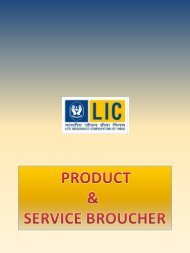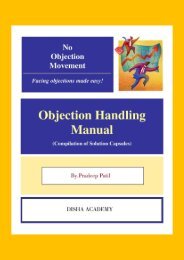INDIAN TRUST ACT 1882 BY.PRADEEP PATIL
UNDERSTANDING TRUST IN NOW A DAYS IMPORTANT FOR MARKETING FORCE OF LIFE INSURANCE
UNDERSTANDING TRUST IN NOW A DAYS IMPORTANT FOR MARKETING FORCE OF LIFE INSURANCE
Create successful ePaper yourself
Turn your PDF publications into a flip-book with our unique Google optimized e-Paper software.
75. Vesting of trust-property in new trustees - Whenever any new trustee is appointed under<br />
Section 73 or Section 74, all the trust-property for the time being vested in the surviving or<br />
continuing trustees or trustee, or in the legal representative of any trustee, shall become vested in<br />
such new trustee, either solely or jointly with the surviving or continuing trustees or trustee as<br />
the case may require.<br />
Power of new trustees - Every new trustee so appointed, and every trustee appointed by a Court<br />
either before or after the passing of this Act, shall have the same powers, authorities and<br />
discretions, and shall in all respects act, as if he had been originally nominated a trustee by the<br />
author of the trust.<br />
76. Survival of trust - On the death or discharge of one of several co-trustees, the trust survives<br />
and the trust-property passes to the others, unless the instrument of trust expressly declares<br />
otherwise.<br />
CHAPTER VIII OF THE EXTINCTION OF <strong>TRUST</strong>S<br />
77. Trust how extinguished - A trust is extinguished - (a) When its purpose is completely<br />
fulfilled; or<br />
(b) When its purpose becomes unlawful; or<br />
(c) When the fulfillment of its purpose becomes impossible by destruction of the trust-property<br />
or otherwise; or<br />
(d) When the trust, being revocable, is expressly revoked.<br />
78. Revocation of trust - A trust created by will any be revoked at the pleasure of the testator.<br />
A trust otherwise created can be revoked only - (a) Where all the beneficiaries are competent to<br />
contract by their consents<br />
(b) Where the trust has been declared by non-testamentary instrument or by word of mouth- in<br />
exercise of a power of revocation expressly reserved to the author of the trust; or<br />
(c) Where the trust is for the payment of the debts of the author of the trust, and has not been<br />
communicated to the creditors at the pleasure of the author of the trust.


















